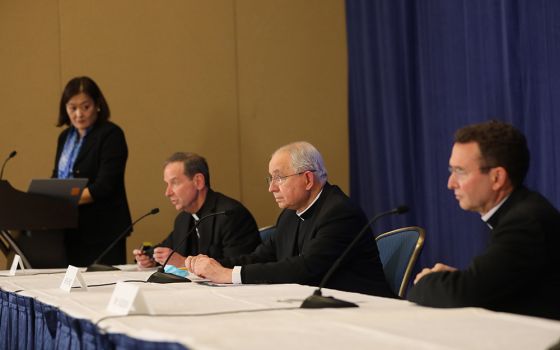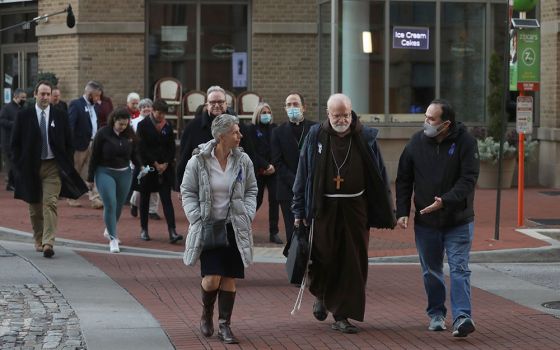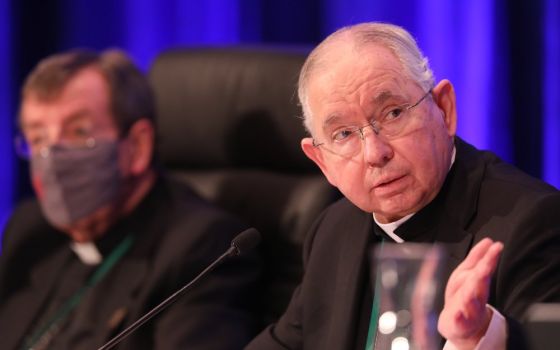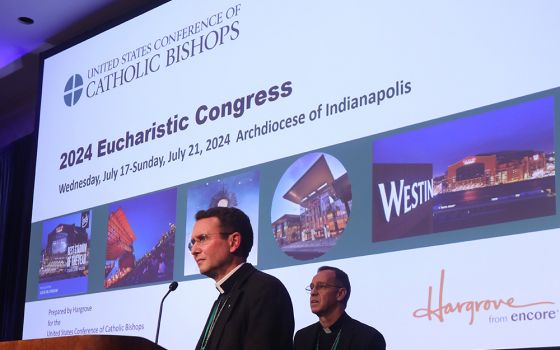
Archbishop Paul Etienne of Seattle, center, and other prelates pray during the fall general assembly of the U.S. Conference of Catholic Bishops Nov. 12, 2019, in Baltimore. The bishops' 2021 fall assembly in Baltimore will require attendees to wear masks, as an indoor mask mandate has been in effect since August. (CNS/Bob Roller)
The U.S. Catholic bishops' fall 2021 general assembly in Baltimore will be their first in-person gathering since the coronavirus pandemic swept through the world in early 2020.
Hundreds of bishops, diocesan officials, conference staff members and journalists will be attending the four-day conference Nov. 15-18, at a time when COVID-19 is still spreading throughout the country.
Attendees will be required to wear masks, as an indoor mask mandate has been in effect in Baltimore since August. The Marriott Waterfront Hotel, where the general assembly will be held, promises signage throughout the premises reminding guests to maintain social distancing and to wear masks while indoors and in all public spaces.
But while a spokesperson for the bishops' conference said organizers would be prioritizing coronavirus precautions during the event, she also declined to answer whether a vaccine mandate would be imposed on attendees.
Chieko Noguchi, the conference's director of public affairs, likewise told NCR that COVID-19 rapid tests will be made available to "anyone in attendance at the meeting who wishes to be tested," but that such testing will be voluntary.
"We continue to monitor conditions and are prepared to adjust to meet this evolving situation," said Noguchi, who added that affiliated groups, observers and guests will be welcomed on a more limited basis than past meetings.
"We have received positive feedback from bishops who are looking forward to gathering for the first time in two years to talk, pray and discuss business together," she said.
Journalists registering to attend and cover the event have not been asked to provide information about their vaccination status.
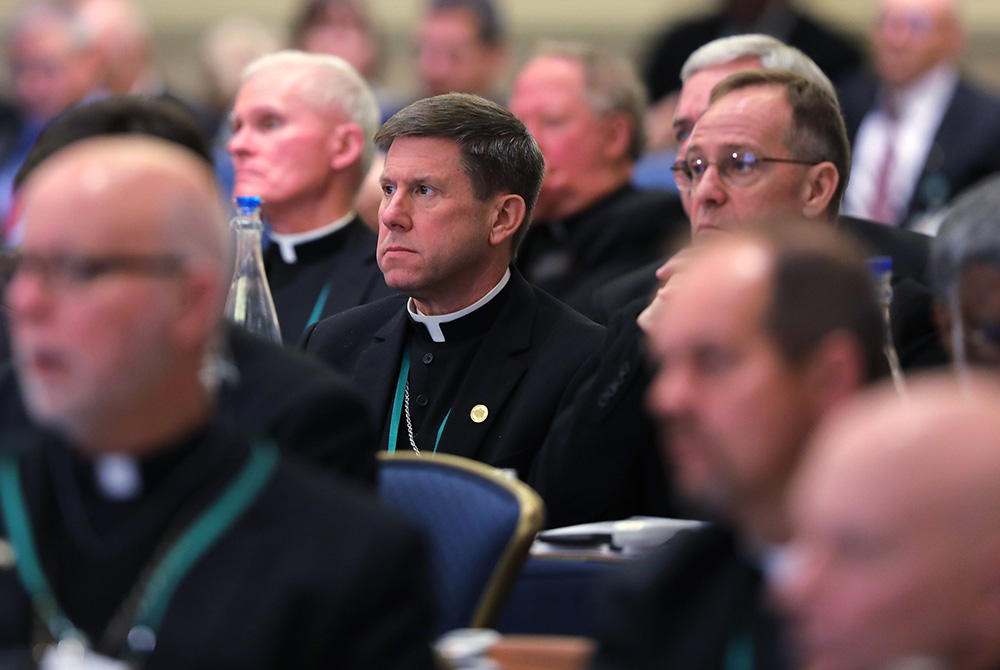
U.S. Catholic bishops attend a Nov. 11, 2019, session during the fall general assembly of the U.S. Conference of Catholic Bishops in Baltimore. (CNS/Bob Roller)
One expert on infectious disease suggested to NCR that the bishops' might have strengthened their coronavirus mitigation strategy by mandating that those in attendance who are not vaccinated be tested for the virus.
Dr. Amesh Adalja, senior scholar at the Johns Hopkins Center for Health Security in Baltimore, said large-scale events like the bishops' gathering have been held safely in recent months amid the pandemic.
Ideally, Adalja said, event organizers would require proof of vaccination for anyone attending a conference where hundreds of people will be present. But with the bishops' conference apparently not requiring attendees to be vaccinated for COVID-19, on-site testing is an effective mitigation strategy, Adalja said.
"If you're going to have unvaccinated individuals there, you may want to test them there on site in order to make sure that no one is bringing the virus in," Adalja said. "If you have an event with fully vaccinated individuals, that's not going to translate into hospitalizations. If you have unvaccinated individuals there, I would test them."
According to the U.S. Centers for Disease Control and Prevention, Baltimore City is in the "substantial" risk category for COVID-19 spread. As of Nov. 2, the city reported having 72.9 new cases per 100,000 residents over the previous seven-day period. Since the pandemic began last year, Baltimore has had more than 61,000 COVID-19 cases, and more than 1,300 people there have died from the virus.
On Aug. 9, Baltimore City Health Commissioner Dr. Letitia Dzirasa issued a public health order requiring city residents and visitors to wear masks while indoors. Masks are not required while outdoors, though the city encourages unvaccinated people to wear masks if they are unable to keep six feet apart from others.
"We know masking works. It has been proven to reduce the spread of COVID-19. Public health experts agree that disease transmission is much more likely in indoor spaces, especially when masks aren't worn. Requiring all residents, regardless of vaccination status, will help reduce the spread of disease," the Baltimore City Health Department says on a website explaining the city's COVID-19 executive orders.
Advertisement
During a press conference in August, Maryland Gov. Larry Hogan said the delta variant, which is more than twice as contagious than the original virus, accounted for nearly every new COVID-19 case in the state.
"The best tools we have to complete this job are our vaccines," Hogan said. "As long as there are unvaccinated people for the virus to be transmitted to, there will be COVID."
The delta and emerging variants are still spreading in Maryland, especially among the unvaccinated. But a relatively high vaccination rate — about 70% in Baltimore — appears to at least be slowing the virus' spread in recent weeks and decreasing local hospitalizations. Adalja said there have not been any reports of Baltimore hospitals being stressed to the point that medical officials are concerned about capacity.
"If you're fully vaccinated, if you get a breakthrough infection, it's likely to be mild," Adalja said. "For many [vaccinated people], a breakthrough infection is not going to be that much of a medical issue."
Legally, at least, the U.S. bishops' conference is not taking any chances. In late October, the conference distributed a waiver to people who registered for the fall general assembly that requires them to "forever release" the conference and its leadership from any legal liability related to exposure, infection and spread of COVID-19.
Since the start of the pandemic, liability waivers — commonly used by schools, gyms and recreational sports — have increasingly been used in other sectors to protect businesses and organizations from liability for customers, guests and participants contracting the virus.
The enforceability of such waivers varies by state and depends on the claims that are made. The waiver for the bishops' conference informs signees that the legal agreement is subject to the laws of the District of Columbia, where such waivers appear generally enforceable.
Noguchi, the bishops' conference spokeswoman, said that in registering for the Baltimore meeting, attendees "agreed to adhere to the latest COVID-19 guidelines issued by the city and/or state government officials, the hotel where the meeting is being held, and the USCCB during the assembly."





